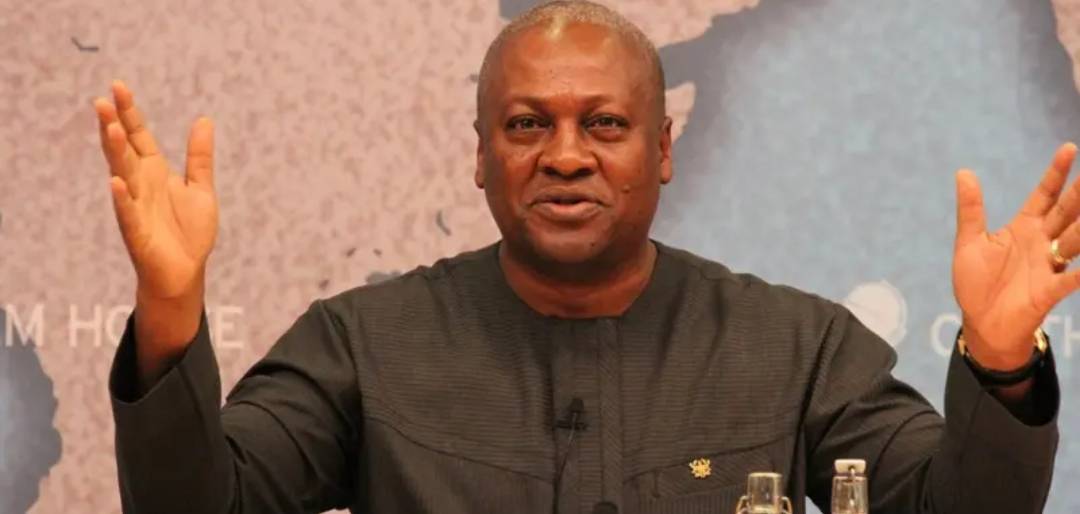John Dramani Mahama, Ghana’s newly elected president, has announced that his government cannot immediately remove the Electronic Levy (E-Levy), COVID-19 levy, and betting taxes. This revelation has left many Ghanaians disappointed, especially since Mahama and his party, the National Democratic Congress (NDC), promised during their campaign to scrap these taxes within the first 90 days of assuming office.
In a recent statement, Mahama explained that the delay in removing these taxes is due to financial agreements between Ghana and the International Monetary Fund (IMF). These taxes are tied to specific conditions set by the IMF, making it impossible for his government to abolish them without risking the country’s financial stability.
The E-Levy, introduced in 2022, taxes electronic transactions such as mobile money transfers, bank transactions, and merchant payments. Since its introduction, it has been a hot topic in Ghana. While some see it as necessary to raise government revenue, others feel it unfairly burdens ordinary citizens.
During the campaign, Mahama strongly criticized the E-Levy, calling it an unnecessary burden. He pledged to remove it if elected. However, now that he is in office, he admits that the situation is more complicated than he initially thought. He assured Ghanaians that his government is still committed to scrapping these taxes but needs time to work within the constraints of the IMF deal.
Another controversial tax is the COVID-19 levy, introduced to help the government cover pandemic-related expenses. Even though the pandemic’s worst days are over, the levy is still being collected. Mahama explained that before his administration can abolish it, they need to review Ghana’s financial commitments and create a fair tax system that doesn’t harm the economy.
The betting tax has also been a source of frustration, especially among Ghanaian youth, who see betting as a popular pastime. Many hoped Mahama’s promise to remove this tax would ease their financial burden. But his recent comments suggest that immediate action is not possible, as the government needs time to stabilize the economy before addressing these concerns.
Critics have raised questions about Mahama’s reasoning for delaying the removal of the E-Levy. They argue that the tax was not originally an IMF condition. It was proposed by the previous government even before Ghana entered into an IMF agreement. This has led some to accuse Mahama of using the IMF as an excuse to avoid delivering on his campaign promises.
In response, Mahama emphasized the importance of acting responsibly. He explained that balancing campaign promises with the realities of running a country is not easy, especially when the economy is under pressure. His government is focused on ensuring Ghana does not face deeper financial problems while finding a long-term solution for the tax issue.
Many Ghanaians who voted for Mahama are understandably frustrated. They believed his campaign promise to remove these taxes would bring quick relief. However, some have expressed understanding of the challenges involved in governing a nation with financial constraints.
Mahama also highlighted the need for open communication between his government and the people. He assured Ghanaians that his administration is working hard to improve the country’s financial situation. He plans to renegotiate certain terms of the IMF agreement to reduce the tax burden on citizens.
At the same time, Mahama pledged to focus on creating jobs, boosting economic growth, and reducing poverty. He believes these efforts will help ease the financial pressures Ghanaians face and build a stronger foundation for the country’s future.
This situation highlights the challenges of turning campaign promises into reality. Running a government requires balancing many priorities, and decisions often come with trade-offs. Mahama’s ability to navigate these challenges will be critical in shaping public opinion of his leadership.
For many Ghanaians, the road ahead remains uncertain. While some are disappointed, others are hopeful that Mahama’s leadership and experience will help the country through these tough times. As his government moves forward, all eyes will be on how it handles taxes and other key promises.
This moment serves as a lesson in the complexities of leadership. It shows that promises made during elections may face unexpected hurdles once a leader takes office. Mahama’s situation underscores the importance of transparency, patience, and realistic planning in governance.
Despite the current setbacks, Mahama has reassured Ghanaians that his government is committed to creating a better future. He urged citizens to trust the process, emphasizing that lasting change takes time and careful planning. In the coming months, Ghanaians will be watching closely to see how his administration addresses the country’s challenges and delivers on its promises.




No comments yet
Be the first to share your thoughts!